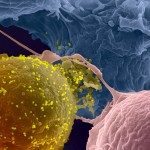Lien vers Pubmed [PMID] – 19706714
J. Virol. 2009 Oct;83(20):10527-37
Type I interferons (IFN) inhibit several steps of the human immunodeficiency virus type 1 (HIV) replication cycle. Some HIV proteins, like Vif and Vpu, directly counteract IFN-induced restriction factors. Other mechanisms are expected to modulate the extent of IFN inhibition. Here, we studied the impact of IFN on various aspects of HIV replication in primary T lymphocytes. We confirm the potent effect of IFN on Gag p24 production in supernatants. Interestingly, IFN had a more limited effect on HIV spread, measured as the appearance of Gag-expressing cells. Primary isolates displayed similar differences in the inhibition of p24 release and virus spread. Virus emergence was the consequence of suboptimal inhibition of HIV replication and was not due to the selection of resistant variants. Cell-to-cell HIV transfer, a potent means of virus replication, was less sensitive to IFN than infection by cell-free virions. These results suggest that IFN are less active in cell cultures than initially thought. They help explain the incomplete protection by naturally secreted IFN during HIV infection and the unsatisfactory outcome of IFN treatment in HIV-infected patients.
Supplementary figures 1-3 :Partial inhibition of HIV

